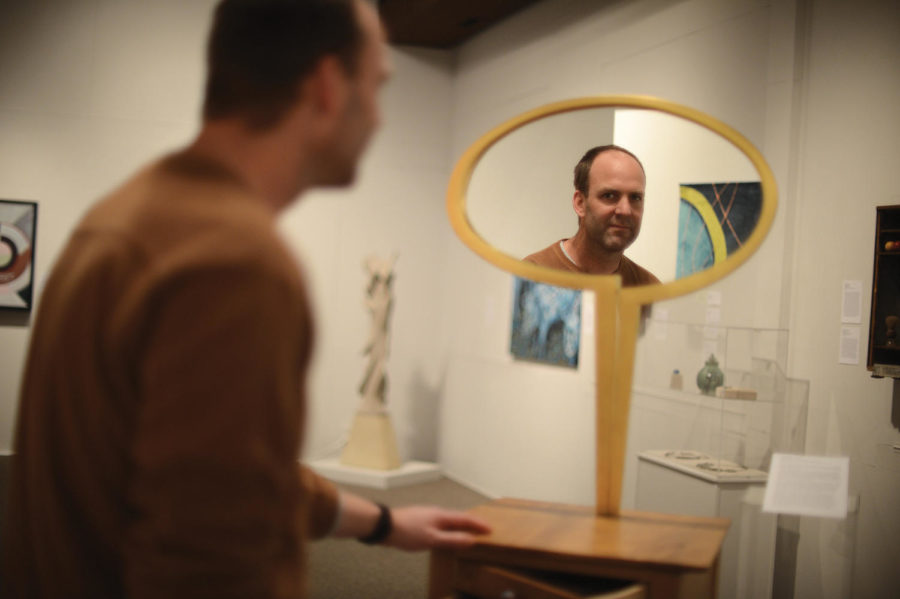Designer Chris Martin works with material science students to make idea into reality
Photo: Huiling Wu/ Iowa state Daily
Chris Martin looks in the mirror of his art piece at the Octagon Arts Center.
February 25, 2013
Chris Martin lived and worked in Ghana as a Peace Corps volunteer from 2008 to 2010. His experiences have been the spark for a lot of his work since.
His project now is not just inspired by Ghana but for Ghana.
Chris is a furniture designer and associate professor for integrated studio arts. During his time in Ghana, he found several issues he felt needed to be addressed. Plastic waste stuck out to him.
Chris said Ghanaians use plastic sachets to collect water. When they finish, they throw it on the ground. Westerners brought plastic when they saw what people were using to collect food and water before.
“Before plastic, they’d put food in a banana leaf or something like that, and when they were done, they’d throw it on the ground and it would biodegrade,” Chris said.
The plastic was a more sanitary way to get water and food, but there wasn’t a way to dispose of it properly.
Chris’ solves this problem by creating school desks from the plastic waste found all over Ghana.
The idea came from Chris’ work in a rural high school in the arts program.
One project he assigned had students create wallets and pouches from plastic bags. Each product would use, on average, about seven bags, depending on how big the item was.
“Through this project, I was sort of thinking of something we could do to use more of those sachets and other waste,” Chris said.
Deforestation and waste of natural resources also attracted Chris’ attention. He also noticed school desks weren’t well made or maintained.
“The school’s desks are made out of solid wood, and they basically cut the trees down, make the desks, they’re poorly constructed, and when they fall apart they leave them to spoil,” Chris said.
That’s when Chris had the idea to simultaneously take care of two problems. His current project is to try to create sturdier desks out of the plastic waste in Ghana.
Chris’ project caught the interest of Michael “Hogan” Martin’s students in material science, who have decided to make developing the plastic material and its construction their senior project.
“There are a number of challenges with this project, the first being what types of plastic are being used,” Hogan said.
According to Hogan, not all plastics combine with each other nicely. Different plastics need to be separated from each other before they combine.
“A technical challenge, especially in Ghana, is to have a way to tell one plastic type from another,” Hogan said.
Identifying one plastic from another isn’t something that can necessarily be done by picking it up, feeling or looking at it.
Hogan explained that once the plastics are separated, they would have to clean and dry the material to prepare them for melting. The melting procedure itself could become a process on its own because of how the material would need to be treated.
“Suppose we get ahold of all of this plastic, we clean it and melt it. The material is going to need to be reinforced somehow,” Hogan said.
Hogan said that plastic is not necessarily sturdy enough to stand up on its own. They would need to add some sort of fibrous material to allow the desk to be strong enough to stand on its own.
Chris believes the process could be taken to a U.S. company to be developed, but the technology involved would be too advanced. He also thinks it would be difficult to make it into something that can be done in Ghana.
“I would like this to be a cottage industry for real livelihoods,” Chris said.
Thanks to the cooperation between two departments and students’ hard work, it may become a reality.

















